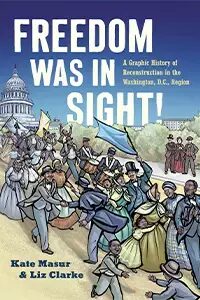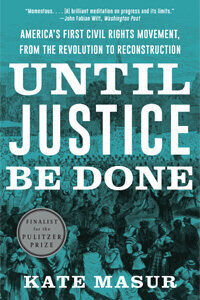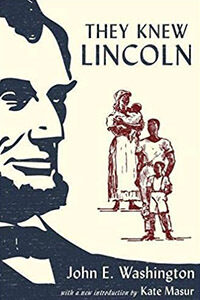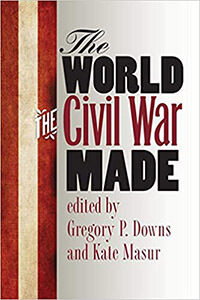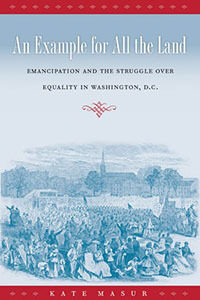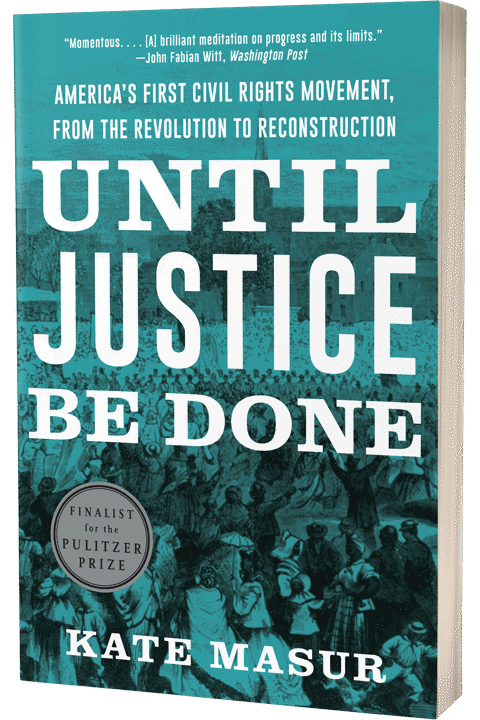“Revelatory….excellent….If this is a clear-eyed book, it’s still a heartening one.”
— Jennifer Szalai, New York Times
Order Until Justice Be Done
Until Justice Be Done
America's First Civil Rights Movement, from the Revolution to Reconstruction
Finalist for the 2022 Pulitzer Prize in History
Winner of the American Historical Association’s Littleton-Griswold Prize
Winner of the 2022 John Nau Book Prize in American Civil War Era History
Winner of the John Phillip Reid Book Award from the American Society for Legal History
Finalist for the 2022 Lincoln Prize
One of NPR’s Best Books of 2021 and a New York Times Critics’ Top Book of 2021
A groundbreaking history of the movement for equal rights that courageously battled racist laws and institutions, Northern and Southern, in the decades before the Civil War.
From the Revolution to the Civil War, conflicts over racial equality as well as slavery gathered force. Beginning in 1803, many free state, claiming authority to protect the public good, restricted Black Americans’ rights to testify in court, move freely, work, vote, and attend school. But courageous Black activists and their white allies, often facing mob violence, built a movement to fight those racist policies. Until Justice Be Done is a magisterial history of the country’s first equal rights movement and its landmark achievements: the 1866 Civil Rights Act and the Fourteenth Amendment.
Praise for Until Justice Be Done
“Masur takes care to show not only the limitations of what was achieved at each step but also how even the smallest step could lead to another. The people she writes about seized openings and opportunities where they could find them, and then they used any hard-won advances to push for more….There are several themes that emerge in this excellent book. The first has to do with how African-Americans led the struggle Masur describes, even as racially discriminatory laws made them vulnerable — whether to the whims of local officials exerting their discretion or to white mobs seeking legal cover for anti- Black violence. Another concerns how the language of race and class was, as Masur puts it, ‘fungible’: Even after the Civil War, legislation cracking down on ‘vagrancy’ and ‘vagabondage’ allowed state legislatures in the former Confederacy to practice discrimination under cover of laws that seemed ‘race- neutral’.”
— Jennifer Szalai, New York Times
“We should feel blessed that Kate Masur…has now turned her attention to the long-sanitized early days of the republic with Until Justice Be Done. Prodigiously researching legislative and court records, pamphlets, petitions, and the press…,Ms. Masur’s monumental account focuses not only on government-sanctioned pre-Civil War racism, but on the efforts by black activists and their white allies to compel America to make good on the ‘created equal’ pledge in the Declaration of Independence….[Masur’s] book should mortify any reader who still doubts that America was in many ways built on a foundation of white supremacy and Black oppression.”
— Harold Holzer, The Wall Street Journal
“Masur’s monumental account leaves no doubt that a generation of 19th-century racial egalitarians altered history. They forced white supremacists to change course, and they created resources used ever since by advocates in the fight for equality.”
— John Fabian Witt, Washington Post
“A clear and compelling account, Masur’s book pushes us to rethink our understanding of anti-Blackness in the North and the activism that helped free Black people through the constitutional amendments that abolished slavery and granted them citizenship and equal protection under the law…. One aspect of Masur’s book that is particularly welcome is her decision to center her narrative on the efforts of Black Americans to achieve a national consensus surrounding citizenship and civil rights.”
— Kellie Carter Jackson, The Nation
“Through her engaging prose, clear narrative framework, and ability to weave in a wide cast of characters, Masur has written a book that will fundamentally reshape the understanding of the abolitionist movement.”
— Erik J. Chaput, Providence Journal
“A rich survey of antiracist politics…. Masur neither idealizes her subjects nor denigrates them for failing to live up to some heroic activist ideal. Their accomplishments were hard-fought, partial, and often precarious, yet real enough given all that their demand for equality was up against. Moreover, in helping to prepare a generation of reformers who went on to make sweeping legal change at the national level, Masur’s first civil rights movement helped create the tools and lay the foundations for modern civil rights reform.”
— Sean Wilentz, New York Review of Books
“Until Justice Be Done is necessary reading for any scholar of U.S. history. In addition to the book’s important contributions to the historiography of activism, law, race, and the Civil War, the book offers striking methodological insights about centering Black actors in historical study, the chronology of U.S. history, the intersection between law and everyday life, and the distinction between civil and political rights, that will provoke discussion for years to come. I also hope that the work will receive a wide readership beyond academia. It is filled with interesting characters, and it frames the essential question of citizenship in a non-polemical manner that may well challenge those of various political stripes to reexamine their ideas and strategies for honoring, changing, or using the Constitution.”
— Ben Davidson, Civil War Book Review
“Marvelous….Until Justice Be Done…is stuffed with fascinating revelations. It is a treasure trove for readers interested in politics, race, and law in antebellum America.”
— Reuel Schiller, JOTWELL Legal History
“Until Justice Be Done pays tribute to the forgotten foundational work that must precede social change. Entrenched interests rarely concede power or privilege until required to do so, whether by law or force of arms, and even if so persuaded, rights won must be protected and defended against repeal. As we see in our own time, America is still grappling with the fact that it was born in slavery and weaned on racism.”
— Brian Tanguay, California Review of Books
“During the George Floyd family press conference following the Chauvin conviction…, Rev. Al Sharpton admonished the audience to remember those in the struggle for equality who had come before: “The movement didn’t start with us. We are a continuation of movements before us and they will continue until [we attain] freedom.” Kate Masur has captured many of those initial legal battles for the soul of this nation. When America finally does realize Martin Luther King’s “mighty stream” of justice, it will stretch all the way back to the headwaters of the Republic.”
— Jim Swearingen, The National Book Review
“A stunning accomplishment .… Masur shows that opposition to racial inequality had much deeper roots than previously thought.… What makes the work so brilliant is Masur’s ability to connect seemingly unrelated events in different states: from the institution of racial restrictions through poor laws to state campaigns against those restrictions to, ultimately, the push to change the entire balance of power in the federal system .… It is a story of heroism and hope: of a biracial movement, built brick by brick, which successfully addressed deeply rooted racial inequalities and changed the course of the country.”
— Laura F. Edwards, Princeton University
“A truly extraordinarily book from which I learned something on almost literally every page .… Kate Masur has written what should be recognized as a classic, upending lots of “conventional wisdom”.… No book published in recent years deserves more careful study by anyone seeking illumination about the American past and pondering any “lessons” of that past for our present and future.”
— Sanford Levinson, University of Texas
“A new and utterly convincing account of the historical roots of the Civil Rights Act of 1866 and the Fourteenth Amendment. This book will forever change the way we think about the history of citizenship, civil rights, constitutional change, and the long struggle for racial justice in America. It is impossible to overstate the accomplishment here.”
— William J. Novak, University of Michigan
“A magnificent account.… [Masur] meticulously details how most American abolitionists were as concerned with the status of African-Americans in the free states as they were to prevent the spread of slavery in the West and the existence of slavery in the South .… Until Justice be Done spectacularly achieves the author’s purpose. [Masur] sheds welcome, richly documented, brilliantly conceived, and accessibly written light on the debates over racial equality … in antebellum America.
— Mark Graber, University of Maryland
“Monumental .… Masur’s book is destined to become a canonical work of reference when it comes to race, law, politics, and citizenship in the antebellum period.”
— Kunal Parker, University of Miami
“Until Justice Be Done demonstrates that the fight for equality and justice is as old as the republic itself. With meticulous research, Masur lays out the history of Black Americans’ struggle to be recognized as citizens — a struggle that started before the ink on the Constitution was dry .… Their efforts laid essential groundwork for future generations, including our own. Masur’s book is both instructive and inspiring as it charts the path to freedom from the 1800s to today.”
— Deborah Mason, BookPage
“Necessary reading .… the book offers striking methodological insights about centering Black actors in historical study, the chronology of U.S. history, the intersection between law and everyday life, and the distinction between civil and political rights.… It is filled with interesting characters, and it frames the essential question of citizenship in a non-polemical manner that may well challenge those of various political stripes to reexamine their ideas and strategies for honoring, changing, or using the Constitution.
— Ben Davidson, Civil War Book Review
“Kate Masur’s masterpiece is an extraordinary contribution to our understanding of the central role of African Americans in conceiving American democracy.”
— Keeanga-Yamahtta Taylor, author of Race for Profit
“In this brilliant book, Kate Masur widens and deepens our understanding of the long struggle against racism throughout the United States.”
— Alan Taylor, author of Thomas Jefferson’s Education
“Kate Masur’s Until Justice Be Done is a masterpiece of scope, insight, and graceful writing about the central question in the making, unmaking, and remaking of an American democracy. This is a book we will read and conjure with for a long time.”
— David W. Blight, author of Frederick Douglass
“A tour de force: Until Justice Be Done is the eloquent and essential story of what the first civil rights movement achieved, and what it left for later generations to do.”
— W. Caleb McDaniel, author of Sweet Taste of Liberty
“A magnificent contribution to the history of antiracism in America.”
— Randall Kennedy, author of For Discrimination
“Kate Masur’s sobering and inspiring history of the ‘first civil rights movement’ could not be more timely.”
— Steven Hahn, author of A Nation Under Our Feet
“[A] tour de force of scholarship and lucid analysis.”
— James M. McPherson, author of Battle Cry of Freedom
“Until Justice Be Done tells the origin story of one of the most important and often-misunderstood ideas in American law and politics: racial equality before the law. It is a brilliant book.”
— Dylan C. Penningroth, author of The Claims of Kinfolk
“In our current moment, as we imagine paths forward for American democracy, Kate Masur’s revelatory book is essential reading.”
— Daniel J. Sharfstein, author of Thunder in the Mountains
